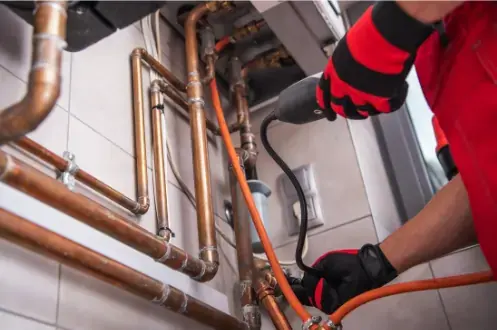Difference between a Gas Fitter and a Gas Plumber
It's likely that you've come across the terms "gas fitter" and "gas plumber" over the years without giving much thought to the difference between the two. These two terms are often used interchangeably, and their specific roles can vary depending on regional regulations and industry practices. However, there are some general distinctions between a gas fitter and a gas plumber. On this information page, we will explain what they are. It's important to note that both must be licensed and certified to work with gas systems, as gas-related work can be dangerous if not done correctly. Therefore, regardless of the specific title, it's essential to hire a qualified and licensed professional gas fitter or plumber when dealing with gas-related installations or repairs to ensure safety and compliance with local regulations.

Role of a Gas Fitter:
Qualified gas fitters are expertly trained to diagnose and repair any gas-related issues as well as install and maintain gas appliances, giving you peace of mind that your gas systems are working correctly, safely, and efficiently. Gas fitting is the pipes and fittings that are designed to get gas, both natural gas and LPG, from the control valve or connection point of a gas container to a gas appliance or another gas container, including associated flues. Gas fitters are qualified to
- Install, alter, extend, or repair any flue associated with a gas installation such as an indoor or outdoor gas heater or gas hot water system flue
- Qualified to connect or disconnect gas container, gas regulator, or gas appliance to or from a gas installation except where it is designed to be readily detachable from the installation. Replacing pigtails or changing over cylinders is exempt from this definition.
- A gas fitter is professionally trained and licensed to work with gas-related systems and appliances. They specialise in installing, repairing, and maintaining gas lines, gas appliances, and gas systems for both natural gas and LPG
- Gas fitters typically work with a variety of gas-related equipment, including gas stoves, furnaces, water heaters, and gas lines for residential, commercial, or industrial purposes.
- They may be responsible for gas line installation, gas leak detection and repair, pressure testing, and ensuring that gas systems comply with safety codes and regulations.
- Gas fitters may work in construction, HVAC (Heating, Ventilation, and Air Conditioning), or other industries where gas-powered equipment is used.
Role of a Gas Plumber:
A gas plumber is a skilled professional responsible for installing, maintaining, and repairing gas piping systems in residential, commercial, and industrial settings. Their primary role involves ensuring the safe and efficient flow of natural gas or propane to appliances such as stoves, water heaters, boilers, and furnaces. Gas plumbers must possess a deep understanding of gas regulations and safety protocols to prevent leaks, explosions, or other hazards. Gas plumbers also perform inspections, conduct leak detection tests, and respond to emergencies involving gas leaks, making their expertise and up-to-date training crucial for maintaining the safety and functionality of gas-powered systems in various environments. Gas plumbers are qualified to:
- A gas plumber is a specialised type of plumber who is also trained and licensed to work with gas systems in addition to traditional plumbing systems.
- Gas plumbers are primarily focused on gas-related plumbing work, such as installing and repairing gas lines for appliances like stoves, fireplaces, and water heaters.
- They ensure that gas piping is properly connected to fixtures and appliances, and they may be responsible for gas leak detection and repair within the plumbing system.
- Gas plumbers may also work on other plumbing-related tasks, such as installing and repairing water pipes, fixtures, and drainage systems.
Gas Compliance and Standards
A licensed gas fitter or a gas plumber must carry out all gas work, this requirement is in place to ensure the safety of the work, that it complies with all codes, standards, and policies, and that the necessary insurance covers the work. Gas compliance is essential to ensure the safe operation of all gas-related equipment and gas appliances in your home or business. On completion of any gas-related work, a Gas Certificate of Compliance or Gas Inspection Certificate will be issued for your records. This documentation is to certify that all new gas installations are in accordance with Australian Gas Standards. Additional Information includes any provisions made for gas safety, such as ventilation, flushing, and purging, as well as any maintenance work that may need to be conducted in order to remain compliant.

If you have any questions, or concerns or need gas services, contact Everyday Plumbing and Gas to speak to one of our qualified technicians on 0406 400 200 or complete our easy online booking form.